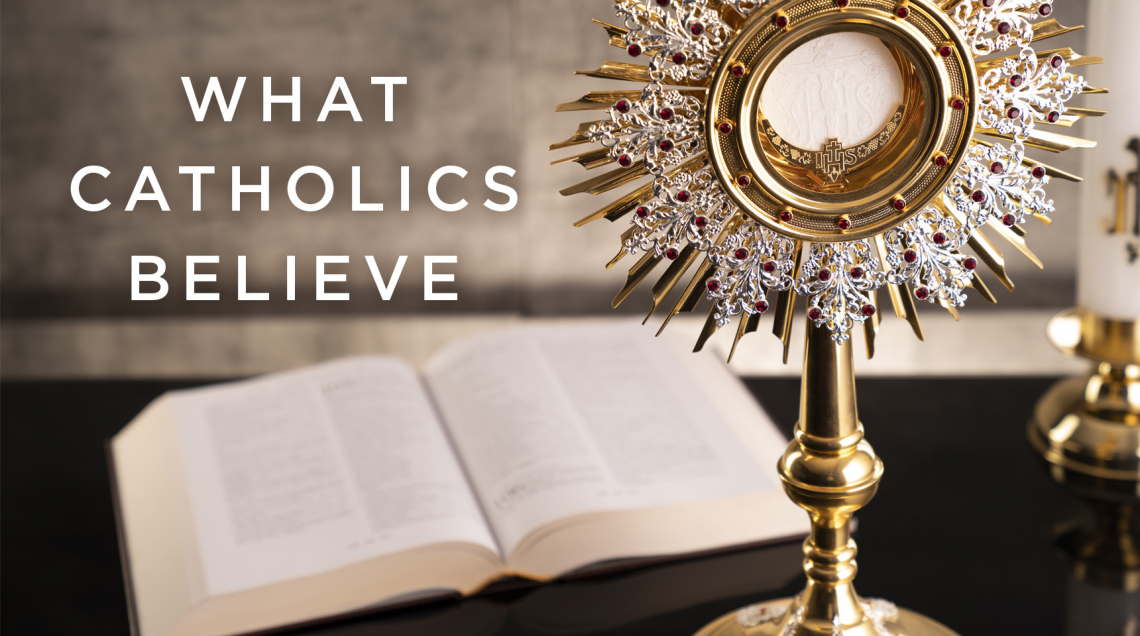The Mass: 'Hear the word of the Lord'

Every Sunday at Mass, all of us are given the opportunity to hear a wide variety of passages from the Old and New Testaments. Many of the phrases spoken at Mass are taken directly from the Scriptures. For example, “Holy, holy, holy, Lord God of hosts” is found in the book of the Prophet Isaiah. “Glory to God in the highest” is a quotation from the Gospel of Luke. In addition, longer passages from the books of the Old and New Testament make up the major part of Mass that we call the Liturgy of the Word.
Readings from the Jewish and Christian Scriptures are among the most ancient parts of Mass. In the second century, St. Justin the Martyr writes to a pagan official about the Christian celebration of the Eucharist saying, “the memoirs of the apostles or the writings of the prophets are read for as long as time allows” (Justin Martyr, Apologia I, 67). Even in that early period, the readings from the Scriptures preceded the celebration of the Eucharist. In fact, there is no instance of an apostolic or historic celebration of the Eucharist where the proclamation of the Word of God does not precede the prayer of thanksgiving over the bread and wine that we call the Liturgy of the Eucharist.
Of course, over the centuries, there has been great variety in which parts of the Bible are read at any given Mass. The current assignment of the specific readings for Sunday Mass and weekday Masses dates from 1969. The Fathers of the Second Vatican Council expressed the desire that a greater portion of the Scriptures make up the readings for Mass. Therefore, on Sundays, we currently hear from all four Gospels, Matthew, Mark, Luke and John, spread out over the period of three years. Each year in the three-year cycle is dedicated to Matthew, Mark, or Luke. Readings from John are heard at special feasts throughout all three years, and for a portion of the year allotted to Mark, since that Gospel is the shortest. On weekdays, selected readings from all four Gospels are read over the course of just one year instead. The proclamation of the Gospel on Sundays or on weekdays is preceded by singing Alleluia and a verse of Scripture or by an acclamation and verse during Lent. In either case, the verse cited generally has some relationship to the specific Gospel passage that is about to be proclaimed.
Except during the Easter season, when the first reading at Sunday Mass is taken from the New Testament, the first reading throughout the rest of the year is from the Old Testament. That reading is always chosen in relation to the particular Gospel on that Sunday in order to show how the Old Testament prefigures or anticipates the actions of Jesus or the teaching of Jesus. In turn, the responsorial psalm that follows the first reading is chosen in relation to the specific Old Testament passage that was just read. Sometimes, the first reading quotes a psalm or expresses the same sentiments as a particular psalm. Thus, we are invited to respond to God, after hearing God’s word proclaimed to us, by singing God’s word back to Him.
At weekday Masses, the first reading is taken from both the Old and New Testaments. A selection of successive passages of the same book of the Old Testament are read for several days or even weeks. Then, the same is done for a book of the New Testament, back to a book from the Old Testament, and so on, until at least some portion of the most significant books of both testaments is heard over the course of two years.
On Sundays throughout the year and on solemnities during the week, there is a second reading after the first reading and its response, and before the Gospel. No ancient manuscripts indicate that the liturgy at Rome ever had more than one reading before the Gospel. Nevertheless, the second reading was introduced in 1969 as a way, once again, to offer a greater variety of readings from the Bible for the faithful to hear. The second reading at Sunday Mass is always taken from the New Testament. Successive portions of the same book from the New Testament are read on a series of Sundays before moving on to another book from the New Testament. The passages chosen bear no particular relationship to either the first reading or the Gospel reading but were designated independently of the other two readings. The second reading is not a feature of weekday Masses unless a special occasion like a funeral or a wedding is involved.
Whenever the Scriptures are read in the Church, God is speaking to His people. The risen Jesus, living at the Father’s right hand, still speaks to His disciples today just as He spoke to the disciples of His own day. Like those first disciples, we do not know how we should pray or how we should speak to the God who created us and redeems us. So, we use God’s own words, found in the Old and New Testaments, to respond to God in thanksgiving for all the good He has done for us.
Msgr. Marc Caron is moderator of the curia and vicar general for the Diocese of Portland.










